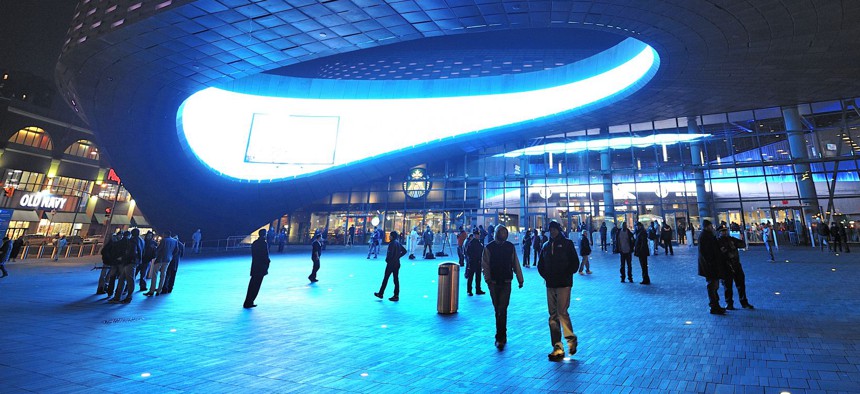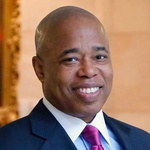A Shield for New York City’s Businesses

Barclays Center in Brooklyn, N.Y. Shutterstock
Nightclubs and entertainment venues can be vulnerable locations to protect and Brooklyn’s borough president, a former police officer, says local agencies must work to ‘harden these soft targets.’
Owners of bars, clubs, and other venues are always preparing: a schedule for performers, food and drinks for customers, and countless details that are critical to success of their ventures.
Unfortunately, these preparations must now include a plan for dealing with an active shooter or other type of attacker who wants to harm a large number of people gathered in a single place. As we remember the images and sounds from Orlando and Paris, we should take proactive measures to minimize the risk of harm to patrons and staff members, while facilitating cooperation with local law enforcement.
As we learned from the 1993 bombing of the World Trade Center, the devastation of 9/11, and myriad failed and thwarted plans, Manhattan has long been a target for terrorists who want to attack the cultural and financial center of the United States, as well as a popular destination for tourists and a magnet for global attention. The positive attention and growth Brooklyn has benefited from in recent years could now potentially lead to an increased risk of attack in our borough; we already have experience being in the crosshairs, having prevented an effort to bomb the Atlantic Avenue subway station back in 1997.
In November 2015, following the horrors witnessed in venues across the French capital, including inside the Bataclan theatre and outside the Stade de France, I held an emergency meeting with the New York City Police Department, New York City Office of Emergency Management, and representatives of more than 20 local entertainment venues, including Barclays Center, Brooklyn Bowl, Brooklyn Brewery, Dyker Beach Golf Course, and Grand Prospect Hall. It was urgent for business owners to be briefed on best practices for preparing for active shooter scenarios as well as collaborating with the NYPD to provide information about possible threats and to coordinate if an act of terrorism occurs.
The meeting called greater attention to the NYPD’s SHIELD program, a partnership between police and private companies through which the department’s counterterrorism bureau and intelligence division offer intelligence briefings and local counterterrorism coordinators work with a business’ operations staff at venues on best practices if case of an attack. As I explained at the time, nightclubs and entertainment venues are often considered “soft targets” that are vulnerable to an attack. We must harden these soft targets.
The program also involves business owners sharing information with the NYPD about any suspicious behaviors observed and, in the event of an attack, detailed information about their property that will allow the NYPD to deploy an effective response. After the many school shootings that have occurred in recent years, our educational institutions have established procedures for reducing the threat to students, teachers, and staff. These procedures include training drills in which people inside the school shelter in place, staying in secure locations away from windows and doors, as law enforcement personnel practice a simulation of the attack. As the threats to many entertainment venues have become apparent in recent years, we are depending on operators to implement similar precautionary measures to avoid becoming “soft targets.”
We need more businesses in Brooklyn and throughout New York City availing themselves of SHIELD, and we need more support for the NYPD to expand this program. Following their attendance at our emergency briefing, a number of institutions signed up for the formal training, with several noting that it would be months before they could get their active shooter training.
We are grateful to the dedicated men and women of the NYPD who have been working diligently to protect our city from terrorism. Civilians must meet their responsibilities as well. The idea behind the “If You See Something, Say Something” campaign extends beyond our subways. Businesses that observe suspicious transactions or other behaviors should report them to the police through NYPD Crime Stoppers. The sharing of information allows many details that might have seemed unimportant to form a complete picture that could demand a response.
By supporting information sharing and coordination, SHIELD has the potential to identify threats before harm has occurred and to respond more quickly than otherwise. After the assassination of a priest at a Roman Catholic church in Normandy, the NYPD immediately notified the community of faith in New York City, and deployed police officers and other resources to protect clergy members and religious institutions.
As the borough president of Brooklyn, a community with some of the most renowned entertainment venues in the world, I understand my responsibility to coordinate with private institutions and local police in order to protect community residents and visitors. An evening out on the town should never end in gunfire. Through our collaborative efforts with the NYPD and its SHIELD program, we will dramatically reduce that threat. We all need to stay one step ahead of those with ill will against us in this marathon race of good versus evil.
Eric L. Adams, a former police officer, is Brooklyn Borough President in the City of New York.

NEXT STORY: Virginia’s Worrisome Hepatitis A Outbreak; Major Pension Investment Headache in Kentucky






 By
By